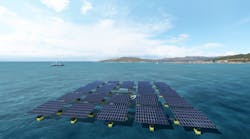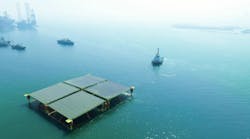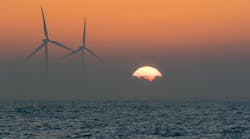Offshore staff
The platform flotation system has been at the port of Ostend in southern Belgium where main contractor Equans has been finalizing assembly. Next month it is due to be towed offshore, anchored and put into operation to acquire data.
Unlike floating solar installations on lakes, SeaVolt has been adapted for operations on rough seas with the modular design said to be suitable as a complement to offshore wind farms.
The SeaVolt consortium and Ghent University, under the framework of the Blue Cluster-funded research project MPVAQUA with further support from the federal government via BELSPO, plan year-round open-sea testing inside the POM-West Vlaanderen-owned Blue Accelerator offshore test zone.
Their proof-of-concept installation will compile data on the impact of waves, rain and salt sprays on various solar panels with different PV panel configurations, and it also will monitor the impact of varying inclinations on the energy output caused by waves and wind. The test results should help the partnership determine the level of protection needed to shield the solar panels from seawater and bird droppings.
SeaVolt is using a lightweight carbon fiber material in this test installation that offers potential benefits for offshore use, although seldom trialed in harsh marine conditions.
Optical embedded fibers and sensors attached to the structure will show whether the material’s structural integrity (in terms of vibrations/fatigue) aligns with numerical models and results from the ocean wave tank and wind tunnel tests.
The test installation also will be used to assess various materials for preventing adverse impacts on the marine environment as well as minimizing buildup of excessive marine growth to the floater to maintain its buoyancy.
Further tests will be staged concerning the combining of the floater systems with mussel cultivation and oyster farming.
In the future, the consortium plans a large-scale demonstration project within an offshore wind farm. If that goes well, large-scale offshore solar energy should move a step closer.
07.27.2023










